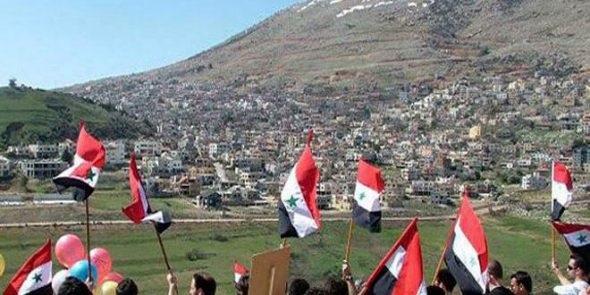The Israeli looting of the Golan’s natural resources and agricultural goods has not stopped for a day since the military occupation and national absence for over more than half a century. The settlers seized an area of 100,000 dunums of Syrian land, used by the settlements to grow fruits and vegetables, grains and flowers, and the rest of the land was classified as natural and military reserves.
Tourism in the occupied Syrian Golan occupies the second place, which includes about 100 thousand tourist rooms, which can accommodate about one and a half million tourists annually.
The population of Israeli settlements controls 500,000 dunams, exploiting pastures, raising livestock and cattle, which provide about 50 percent of the meat to the Israeli market, and 20 percent of milk production. As for water resources, it is one of the most important uses of “Israel” from the natural resources of the Golan. Since 1968, on military orders, Israel seized all water sources, seized 100 water springs, built 20 water pools and an artificial pond that can accommodate 100 million cubic meters of rainwater and springs, which it uses for agriculture. 30 percent of the water for Israel comes from it.
A few years ago, one of the settler rabbis, in the occupied Syrian Golan, issued a religious edict filled with malice, cunning and forgery, saying, “Whoever builds a house here, has treasures that are lacking in all the inhabitants of the Jewish kingdom. This is the land of blessing and goodness, the land of grapes and honey, and whoever dwells here; possesses the greatest treasures of this blessed land with Jehovah (the Lord).
Today, the Golan embodies an ethical, emotional, political, and national battle in which a military occupation is based on military power and biblical military and religious pretexts.
Water and artesian wells
In 1993, Shimon Peres, the engineer of the Greater Middle East, stated that “water is before the land, if we agreed on the land and did not agree on the water; we will discover that we have no real agreement.” As Zvi Otberg, head of the Tiberias Water Authority, said: “If the water shortage in Israel increases and we cannot solve problems peacefully, they must be solved by war. There is no other option. Water as blood one cannot live without it.”
The Israeli water company “Mekorot” confirms that “Israel” gets one-third of its consumption of drinking water, irrigation and other uses, from the water of the Golan and Mount Sheikh, and estimated the amount of water in the Golan about 20 million cubic meters, and the amount of water stored in the Golan about 1.2 billion Although water is not the number one natural treasure for Israel, there are important alternatives such as exploration stations in the settlement of Shamir, where water is shared between the Golan and Galilee.
Electricity production by solar energy and air fans
The solar power plants in the Golan, in various Israeli settlements in the Golan, are part of the project to transform the Golan into an environmental and green area, and based on several studies conducted; The Israeli government has approved the construction of 42 fans in the Tal al-Fars area and 30 in the Mansoura plain. Today, Energix plans to establish a project to generate electricity from wind power in the occupied northern Golan, using wind turbines in the areas of Horror and Sahita, inside agricultural lands owned by farmers from Masada and Majdal Shams, with a production capacity of 150 megawatts and thus threatening the agricultural wealth of Syrian farmers.
Medical tourism is managed by several Israeli settlements in the name of the so-called “Hammamet al-Hamma” project, founded by the Lebanese Sheikh Suleiman Bey Nassif, in the forties of the last century, in addition to many means of recreation and enjoy the nature of the Hamma and the zoo and ancient monuments, while replenishing the settlement With the full annual revenues up to 2013.
Oil is an economic and strategic asset
In the early 1990s, Israel began attempts to explore for oil in the occupied Golan. It stopped during the Yitzhak Rabin government, following negotiations between Israel and Syria, but in 1996, after Benjamin Netanyahu came to power in his first term as prime minister, there were renewed voices. Prospecting for oil and gas in the occupied Golan, especially after being considered “Israeli” as an area under Israeli law, after the Knesset announced the annexation of the Golan on December 14, 1981.
There is intense work today to obtain approval for the implementation of detailed plans for the treatment of waste and air pollution, which was approved by the Israeli Ministry of Environment and the Parks Authority and other Israeli ministries. Extraction of oil and other important minerals in the ground, strengthens the status of the Golan Heights to Israel as a strategic asset. Finding a large amount of Golan oil will help reduce dependence on foreign oil, and create more jobs help in the fight against unemployment . I can finally say that Israel is living and stealing the Golan natural resources.
Haifaa mafalani

